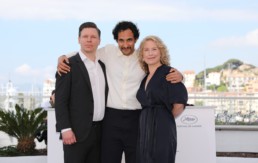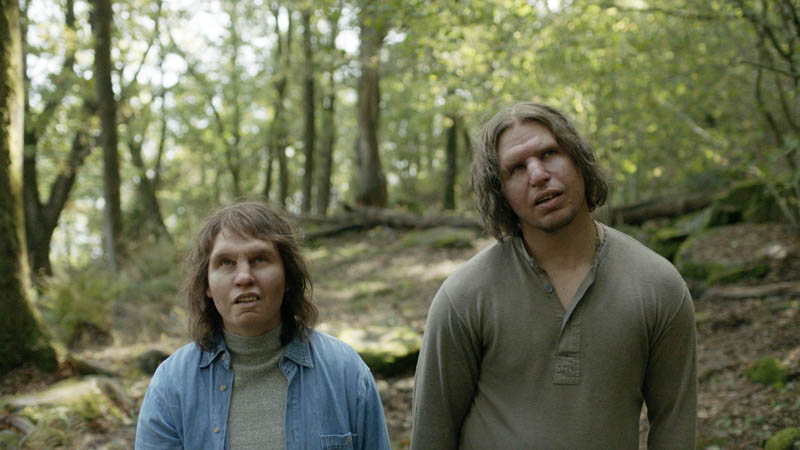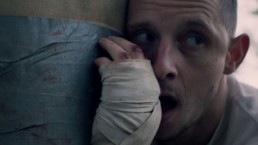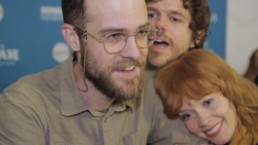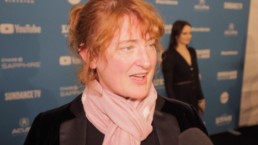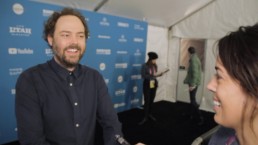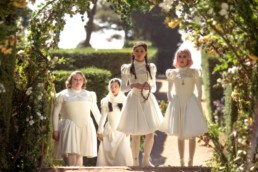Eva Melander: "It takes so much energy to keep calm"
On that Monday afternoon, the restaurant in The Hollywood Roosevelt Hotel was bustling with tourists taking Instagram selfies and businessmen deep in conversation. Sitting at a round table located discreetly in the back of the room, were Border director Ali Abbasi and actress Eva Melander who had just finished their drinks, leaving only a lemon and lime wedge near the empty cups. I sat down at their table, eager to talk about the Swedish fantasy thriller that was easily among my top films of 2018. In our interview, we talk about Scandinavian cinema, gaining 40 lbs., and more...
(Recently, Border was one of the films caught up in Oscar politics during the short-lived decision to cut out four categories from the broadcast, one of which included "Best Makeup and Hairstyling", which was- shockingly- the only nomination the film received. Luckily, a last-minute reversal of that decision saw to it that Border would indeed get its deserved time in the spotlight.)
The reality of Scandinavian cinema
Ali: There's a strange thing about the film industry in Scandinavia. Denmark, for me, is like a cultural colony of the United States. The Danish language is turning into "Danish with English words". In these Nordic countries, about 70% of programming is in English. TV series, children's shows, talk shows, everything. Then you have a totally different financing/political system. The United States has a very active role in the film industry, which makes a huge difference. What I've come to learn is that movies are made not because they are the best ideas, but because those are the movies that could be financed.
As a director, the main difference between Scandinavian vs U.S. cinema is the creative control you have. In Scandinavia, I have final cut unless I negotiate it away. Here, I don't have final cut unless I negotiate to get it. It's a night and day difference in that regard.
Magical realism inspired by South America
Ali: I started my career as a writer and have always been inspired by South American magical realism. It resonated with my world views, especially the political/social climate in Iran- where I come from- because my reality could be so strange. Things could be hard to comprehend even if it happened in front of your eyes. On a good day, you become interested in magical realism, on a bad day you become really paranoid and interested in conspiracy theories. This is like a disease in the Middle East, you know, people thinking 'Americans took our oil' and all these other countries 'conspiring' against us. As a political ideology, I think it's terrible. But as a literary cinematic device, I think it's fascinating.
Eva: When I was a kid and watched movies, I was often very bored because I didn't think the content connected to the world I was living in. I was obsessed with the [lack of common people] on television, not just the "movie stars." I was a very social-realistic kid haha.
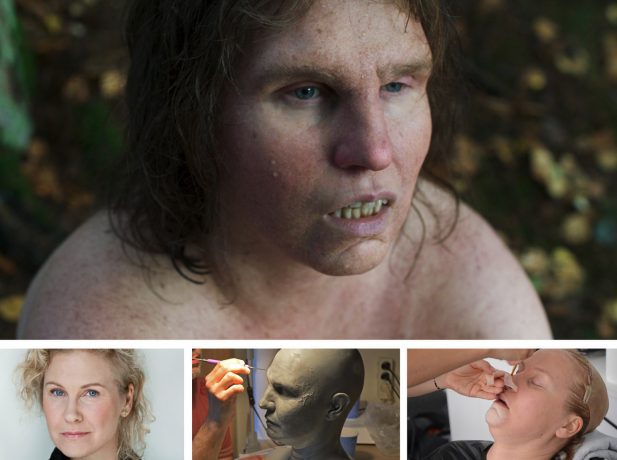
Courtesy of Göran Lundström
Prosthetics taught Eva patience
Eva: I love transformation. I like to put characters on the screen that you don't commonly see and this role was the ultimate transformation. It took 4 hours to put on [prosthetics and makeup], so when we would start shooting at 6.30 am, I'd be in the makeup chair at 2 am. I'd work over 15 hours a day- 4 hours of prosthetics, 10 hours of shooting, and 1 hour to take everything off. I just had to save my energy in every moment, those 4 hours consisted of me basically trying to meditate through it all. I would listen to different mindfulness apps, I felt like an untrained Buddha! I learned a lot about patience. I gained 40lbs.
Ali: This is the first time it has actually struck me just what that process meant! While you were talking I was thinking about if I had any similar experiences, and I just thought of my flight to Los Angeles that was 12 hours. If I was in your position, not able to move, I would kill myself! I would start cutting myself just to see something happen! You were able to pull this off because you have an inner calm.
Eva: Oh, you could easily go crazy. It takes so much energy to keep calm. But it had to be done.
The importance of being ignorant
Ali: I gave a talk at the London Film Festival about the importance of being ignorant. Had I known what the transformation process was [for Eva], I would've been so stressed and thought so much about it. It would have affected everything. And this isn't just the prosthetics, this is all the components it takes when making a movie. Of course, if everybody's ignorant that would be a problem, but I think it's good to limit the scope of what you worry about.
Eva: It was so important for me to just be in the moment. If I was thinking about what I was about to go through, I probably wouldn't have been able to do it. Throughout this process, I actually surprised myself.
Courtesy of Ali Abbasi/Still 21
The transformation process didn't scare Eva away
Eva: Absolutely! If I had the flexible schedule, I would take on another role like this one.
Ali: I remember we were in San Francisco, and Eva was talking about Alicia Vikander and how she gained 10lbs of muscle and cut her hair [to play Lara Croft] in Tomb Raider and that was big news in Variety or something. And Eva was like, 'Ha! I gained 40lbs!' Haha
You're only as good as your last movie
Eva: You never know what's going to come out of what you do. That's part of the pleasure. I was just so happy that we were going to have the World Premiere at Cannes because I knew people would be interested it in. From then until now, yes, it has been a great success.
Ali: My biggest wish for you, Eva, is that now you've gotten this boost of visibility and from now until you die, you have the opportunity to do 1,001 crazy characters.
Eva: Awww, that's awesome.
Ali: As for me, this is an old, tired saying, but I think it's very true: You're only as good as your last movie. Right now, I feel good. But in a few years' time that can change very easily. What I really want from this is that I'm able to continue working in my little corner. I feel like I'm at a point where people who need to know me, know me. People who don't need to know me, don't know me. I'm not afraid of going into the street and having people stop me for my autograph. If I can keep working like this, then I'm really happy.
'Donnybrook' Review: Unapologetically Fierce
It's Fight Club meets The Place Beyond the Pines in director Tim Sutton's heavy drama, Donnybrook. Set in the outskirts of middle America, the film is a rough examination of living among poverty, crime, and risking it all for a fresh start. Here's what you need to know.
Eyes on the prize
Based on the novel by Frank Bill, Donnybrook tells the story of Jarhead Earl (Jamie Bell), a former Marine who is passionate about bare-knuckle boxing and willing to do whatever it takes to compete in one of the most infamous underground fights in the country. The $100,000 jackpot offers Jarhead the opportunity to better his life and that of his family, like being able to afford treatment for his drug-addicted wife, Tammy (Dara Tiller). With his eyes on the prize, Jarhead uproots his family from their disheveled motorhome and they make their way toward the Donnybrook, but little do they realize that Tammy's drug dealers, Chainsaw Angus (Frank Grillo) and his sister Delia (Margaret Qualley) won't let them skip town that easily.
At this point, Jarhead doesn't know that Chainsaw is hot on his trail and in a twisted turn of events, an additional party is added to Chainsaw's pursuit. Police officer James Badge Dale, whose past is as dirty as his typical drunken state, is on a mission to track down Chainsaw and catch this drug-selling felon once and for all.
Blame it on the peacoat's popped collar
As if the picture hasn't been painted clearly enough thus far, Donnybrook is a heavy film- lots of blood, death, and booze. Violence runs wild in middle America and in the world of Donnybrook, the outcome is bleak. While this intensity can feel overly showy at times, there was one moment that completely took me out of the movie and, I'll admit, it's a silly annoyance: I couldn't stop staring at Chainsaw Angus' popped collar on his peacoat. It is so out of place and intentionally stylized in an otherwise disheveled and highly desperate community. Not only that, but I highly doubt that a man who is almost 100% pure muscle, practically machine-built, with a name like "Chainsaw" would be wearing a peacoat.
From the Dark Night to Donnybrook, a bleak portrait of America
In his last feature, Dark Night, Tim Sutton took inspiration from the horrific true events of the Aurora, CO movie theater shooting, where a midnight screening of The Dark Knight turned into a midnight massacre. This docu-drama blurred the lines between reality and fiction, due in large part to the freestyle camerawork and effortless performances. Donnybrook is a much larger production than Dark Night, both in story and scope, but its overarching themes of despair and sadness ring similar. The moody and beautiful color palette create rich images of poverty and desperation, a cinematic juxtaposition at its finest. There is no doubt that Donnybrook is a transfixing film, even if the subject matter is a difficult watch.
Unapologetic and fierce
The physical endurance and emotional depth Jamie Bell reaches throughout the course of the film is truly remarkable. He transforms his body into that of an amateur boxer, his muscles being a point of awe all on their own. For as heavy-handed as Donnybrook is, Bell is the backbone that gives the film a glimmer of hope in the darkest of situations. He is proof that not all of humanity has evil intentions. Unapologetically fierce with an abundance of striking visceral mayhem, Donnybrook is an intense watch that will certainly leave you feeling like you endured nine rounds of emotional gut punches.
Donnybrook is 101 minutes. Opening today at Laemmle Monica Film Center, Arena Cinelounge, and more.
Daniel Scheinert Gets Weird in 'The Death of Dick Long' [WATCH]
We catch up with director Daniel Scheinert (Swiss Army Man), screenwriter Billy Chew, and actors Andre Hyland and Virginia Newcomb before the World Premiere of 'The Death of Dick Long' at the 2019 Sundance Film Festival.
Premise: Dick died last night, and Zeke and Earl don't want anybody finding out how. That's too bad though, cause news travels fast in small-town Alabama.
Jennifer Kent Talks Female Strength in 'The Nightingale' [WATCH]
We catch up with director Jennifer Kent (The Babadook) and actors Aisling Franciosi, Michael Sheasby, and Harry Greenwood before the North American Premiere of The Nightingale at the 2019 Sundance Film Festival.
Premise: Set in 1825, Clare, a young Irish convict woman, chases a British officer through the rugged Tasmanian wilderness, bent on revenge for a terrible act of violence he committed against her family. On the way, she enlists the services of an Aboriginal tracker named Billy, who is also marked by trauma from his own violence-filled past.
Drake Doremus, Garret Price Remember the Late Anton Yelchin
We catch up with director Garret Price and producer Drake Doremus before the World Premiere of Love, Antosha at the 2019 Sundance Film Festival.
Premise: A portrait of the extraordinary life and career of actor Anton Yelchin.
https://youtu.be/KmUBAP_w6fI?si=KvPCc-TB71jPW7YC
'Paradise Hills' Review: Beautiful Chaos in a Futuristic Rehab
Full disclosure, I didn't intend on seeing 'Paradise Hills' while at the Sundance Film Festival. The only reason Ryan and I ended up in line
Mademoiselles held against their will
Paradise Hills, directed by first-time feature filmmaker Alice Waddington and written by Nacho Vigalondo (Colossal), is a Spanish-American fantasy film centered around the free-spirited Uma (Emma Roberts) and her girl gang. After being sent to a girls-only futuristic rehab on an undisclosed island somewhere on planet Earth, Uma becomes irritated at the lack of control she has over her life. Under the direct supervision of "The Duchess" (Milla Jovovich), all the girls, or mademoiselles as they're referred to by the posh rehab counselors, are forced to dress in ultra-feminine wear, partake in tea time, and make flower crowns- of which only one extracurricular activity is fully explained towards the end of the film.
Uma quickly creates a strong bond with her roommates, Yu (Awkwafina) and Chloe (Danielle Macdonald), but is slower to warm up to the Latin pop star, Amarna (Eiza González). Uma and Amarna's rift doesn't last beyond the film's initial scenes as they realize that, in order to break out of this saturated sanctuary, they're going to need to stick together.
Whimsical stylings overshadow basic plot points
The nods to David Bowie's Labyrinth and Disney's Alice in Wonderland in both story and style are undeniable, yet Paradise Hills falls a short in being considered an equal among these cult classics. Whimsical production design and costumes that look like The Hunger Games-meets-Vogue can only propel Paradise Hills so far. The lackluster script mixed with tepid performances and the absence of basic plot points- like any information about our protagonist's backstory, location or a reference to date/time- are all reasons why I felt disconnected from the film. It's hard to be invested in a character's well-being when there isn't any tangible information to create empathy.
Fantasy gone wrong
The lack of the essential Who, What, When, Where, and Why is ultimately Paradise Hill's biggest downfall, even the headlining cast and colorful onscreen distractions aren't enough to sell this fantasy. Emma Roberts gives a lukewarm performance as Uma; even at the height of the drama in the film's climax, it feels as if she is just reading lines from the script. Milla Jovovich as the stereotypical "Evil Stepmother" of this reform camp is melodramatic and over-exaggerated, creating an off-balance dynamic in her scenes with Roberts. Even Awkwafina, star of last year's Crazy Rich Asians, generates a sense of discomfort and awkwardness as she sheds her "funny girl persona" to play a character riddled with anxiety and depression which seemed like a waste of talent.
Risky business
The best part about the Sundance Film Festival is knowing that every film that earns a spot in the lineup was made with heart, soul, and a whole lot of risk- Paradise Hills is no exception, as it was by far the most boundary-pushing film I saw all week. Its dedication to building this world was not overlooked, although it would've been nice to know specifically what world we were in.
Paradise Hills is currently seeking distribution. 95 minutes.
'Untouchable' Review: Forgiveness for Sex Offenders?
If you're looking to start the year off with a provocative and thought-provoking documentary, I suggest watching Untouchable, a film that examines the divisive topic of sex offender laws and the people they affect.
Director David Feige's 2016 Tribeca-winning doc is centered around one father's uncompromising quest for justice for his daughter and his mission to keep her abuser- the family's former nanny- behind bars and stigmatized for life. But that begs the question- is redemption for sex offenders possible?
The harshest laws in the nation
Sexual abuse doesn't discriminate against race, religion, or status- just ask Ron Book, the most powerful political lobbyist in Florida. When he discovered that his daughter, Lauren, had been the victim of horrific sexual abuse, which took place for years under his own roof by someone he knew and trusted. As a result, Ron was determined to make a change. His legislation, which passed and is currently the strictest in the nation, sent sex offenders into exile. With its enforcement, those convicted must live within certain boundaries, away from public gathering spots where children frequent like schools and parks, many of the accused have succumbed to homelessness. They live under bridges, without tents, because legally, per Book's law, that is the only place they can live. And while over 800,000 people have been affected by these new sex offender laws, this doesn't take in to account the number of people associated with the convicted offender whose life is also uprooted and forever changed.
An indefinite stigmatization
Ron Book shows no sympathy for the people convicted of these crimes, but that is understandable. As a bilateral victim, he is justified in his feelings of hatred. However, there are people on the other side of the issue who feel that sex offenders are the only subcategory of people who "cannot" re-build their lives, they are forever stigmatized as criminals. Murderers, drug addicts and more are encouraged to turn their lives around with the promise of a "fresh start" and "new slate", but the same doesn't apply to sex offenders. Feige interviews some of the people who feel as if they have been stigmatized indefinitely.
Is redemption possible? Louis CK doesn't help the argument for "Yes"
Untouchable is uncomfortable, as is its intention, although David Feige and team likely didn't purposefully include a clip from comedian Louis CK's controversial monologue about child molestation and how "it must be good if people are willing to ruin their lives for this act" just to be controversial. Given the hot water Louis CK finds himself in currently over his own sexual abuse accusations, this "joke" feels too creepy and ill-timed to prove any sort of point for the accused. By the film's end and after a thorough job examining both sides of the issue, Untouchable will force the viewer to debate this hot button topic and leave us with this loaded question: should there be redemption for sex offenders?
'Untouchable' is not rated. 105 minutes. Available on VOD today.
Cinemacy's Top Films of 2018
What we consider to be among the top films of 2018 represents a combination of the movies that had the greatest emotional impact on us, matched with movies that felt innovative or groundbreaking. Here are the films that we consider to be the best of last year:
Morgan's Top 10
10. Assassination Nation
9. Isle of Dogs
8. The Sentence
7. If Beale Street Could Talk
6. Private Life
5. Won't You Be My Neighbor?
4. Vox Lux
3. First Reformed
2. The Favourite
1. Eighth Grade
Honorable mention: Shoplifters
Ryan's Top 10
10. Isle of Dogs
In his second foray into stop-motion animation, the twee-minded Wes Anderson sets out to answer the question: “what does a Japan-set dystopian world that banishes all dogs to a series of inter-connected refuges known as Trash Island look like?” It’s not news that Wes Anderson has invented entire worlds unto themselves in almost all of his films, but Isle of Dogs is one of this year’s clearest achievements in total ground-up creation and imagination. By not only realizing such a visually intricate world full of detail-rich locations but finding the heart in every mangy dog’s sneeze, Anderson and his team of animators pull off one of the year’s greatest feats in film-making. I loved every frame of it.
9. Won’t You Be My Neighbor?
As time goes by and people continue to be divided by generation, more and more the idea of having cultural “icons" who are able to cross-over and connect multiple generations becomes a more unlikely thing, which in turn might make for more isolated human experiences. Perhaps it was perfect, then, to watch Morgan Neville’s (Jane, xx) latest documentary about one of these last-of-his-kind national figures who was adored by audiences of all types. Beyond being a beautiful and gentle handling of the life of Mr. Rogers, showcasing his values of love and self-acceptance, hearing older audiences sing along to the "Mr. Rogers' Neighborhood" theme song showed the tear-jerking beauty in shared emotional catharsis and connection that, these days, feels too few and far between.
8. Border
I had near-zero knowledge of what I was getting myself into before settling in to see Sweden’s official entry for Best Foreign Film, and that’s exactly how I recommend going into this film. What might best be described as a fairy tale set in modern day, Border follows an unsightly but uniquely gifted customs agent (Eva Melander, in incredible make-up) in which the arrival of a mysterious man leads her into discovering the shocking truths of a vile human – and not so human – underworld. One of the most daring and wildly conceptual film I saw all year, Border delivered a profound feeling that has resonated with me ever since.
7. Hereditary
Hereditary stood tall this year as a brilliant display of auteur-minded horror, showing the arresting power that cinema can waver so powerfully over its audiences. Seeing this A24-produced horror film during its opening weekend with a theater full of audience members was one of the most thrilling and exhilarating movie-going experiences I had this year, the whole room jumping out of our seats and holding breaths through the film's tensest moments. While I might have wished that some of Hereditary's many ideas were further fleshed out, and even that some ideas were pulled back on (to say the film's final coven-inspired sacrificial ceremony was too "conventional" might be an odd thing to say), but with its jaw-dropping nighttime photography and Toni Collette’s chilling, trauma-inducing performance, this film had no problem burning itself into my psyche.
6. Vox Lux
The thing about pop culture is that for all its commercial fantasy and celebrity-worshiping, that there must be reasons and needs for why society feels the need to escape, and which harsh realities society doesn't wish to face. It's a relationship that director Brady Corbett examines in this portrait of a Gaga-esque pop star's rise to fame, from center of national tragedy through Madison Square Garden headlining fame. Shot with imaginative style with Terrence Malick-like sobriety, commenting and showing its horrific and tragic American events, it's a timely and necessary reflection and reminder of the sound of a burst when it pops.
5. Eighth Grade
Another film that handled the duality between invented reality and the less satisfying, more anxiety-ridding real one, was the directorial debut of stand-up comedian and former YouTube sensation Bo Burnham. Like an unexpected front-facing flash from a camera selfie, Burnham turns the camera on a generation that, at his young twenty-eight years of age, that he is now removed from: Gen Z, the first generation of kids to grow up in a totally internet-connected world. The identity crisis of a girl going through her final year of eighth grade feels perfectly of-the-moment with what feels like a universal existential crisis that's being experienced, impressively captured with understanding, sympathy, and wisdom.
4. Minding the Gap
While the story of young skateboarders who seek to escape their dysfunctional family upbringings by goofing off together was brought to the big screen this year in Jonah Hill's semi-autobiographical directorial debut Mid90s, it was the Hulu original documentary Minding the Gap that proved to be the deeper and more affecting examination of the same subject for me. What starts off as a skate video following the fun hang-outs between a group of Illinois kids slowly takes shape into something much bigger; an examination of issues like job-insecurity, race, and domestic abuse that they each experience first-hand. Most impressively, this years-long ranging story (of which comparisons to Boyhood have been attributed) are all captured by one of these kids himself – Bing Liu – who applies his one-man movie-making skills to write, shoot, direct, edit, and interview all of his friends in what was one of the most unexpectedly affecting films of the year for me.
3. American Animals
Somewhat embarrassingly, I had not seen Bart Layton's critically acclaimed first feature film, The Imposter, before seeing his second film, American Animals. So when I saw the film in theaters, I was stunned and transfixed by the way Layton used an array of tools and techniques to tell the real-life story of four young undergrads who set out to steal some of the nation's most prized art books. Infusing documentary-style interviews and meta elements of memory and perceived truths (much like what is on display in The Imposter), Layton re-writes the rules of what is possible to do in movies and one that I praised and recommended any chance I got this year.
2. Cold War
I'd heard great things about director Pawel Pawlikowski's follow-up to his 2013 black and white historical drama Ida (I was aware the film was nominated for a Palme d'Or at Cannes Film Festival, with Pawlikowski walking away with the award for Best Director). And after seeing the film I can both understand and join in the film's praise. A historical drama centered around Poland's post-World War II efforts to strengthen its national identity by celebrating its music through concert performances, at its heart the film is a love story between the Polish music director (Tomasz Kot) and a beguiling, transfixing singer (Joanna Kulig). Spanning multiple years that sees the pair kindle and then re-kindle their relationship amidst national anxieties and struggles (the film was based on the director's own parents' story), Cold War is one of the best films I saw this year or any other.
1. Roma
It seems like the best film of any year somehow ends up linking to the present moment of social politics and culture. The film that had the most profound effect on me, that stands in dignified defiance to the loud, shouting discourse that leads American politics today, is a story about a quiet, humble and sympathetic Mexican maid that does nothing more than tend to her family. Alfonso Cuarón comes off of his space-survival film Gravity to make this visually and beautifully rich autobiographical film. Roma is also a triumph for breaking from traditional narrative film, furthering its themes of total liberation. Shot in black and white 65mm film, there are a number of striking images that transcend the film. Roma opens up like a flower, blooming throughout until it finally reaches beautiful emotional catharsis. Credit the streaming giant Netflix for putting stock in this auteur director’s original film.

